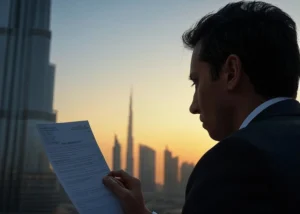In recent years, Dubai has solidified its reputation as a global financial hub, fostering an environment that attracts international investors, businesses, and financial institutions. The city’s banking sector, in particular, has seen rapid growth and modernization. One of the most significant developments in this regard has been the introduction of Decree 23 of 2022, a legislative measure that promises to be a game-changer for the Dubai banking sector.
What is Decree 23 of 2022?
Decree 23 of 2022, officially known as the Dubai International Financial Centre (DIFC) Banking Law, was introduced to enhance the regulatory framework governing the banking sector within the Dubai International Financial Centre (DIFC). The DIFC, an onshore financial hub located in the heart of Dubai, has long been a magnet for global financial institutions, thanks to its world-class infrastructure, regulatory autonomy, and strategic location between Europe and Asia.
Decree 23 brings a suite of reforms aimed at improving operational efficiency, regulatory compliance, and overall stability within the DIFC’s banking sector. It is part of the UAE’s broader vision to further modernize its financial infrastructure and align it with international best practices. With this decree, the UAE aims to continue its progression as a global financial center while maintaining the security and transparency of its financial systems.
Key Features of Decree 23 of 2022
- Enhanced Regulatory Oversight One of the most notable features of Decree 23 is its provision for stronger regulatory oversight of banks operating within the DIFC. The Decree strengthens the powers of the Dubai Financial Services Authority (DFSA), the independent regulatory body responsible for overseeing financial services within the DIFC. The DFSA’s enhanced role will ensure that banks adhere to higher standards of governance, transparency, and risk management.
- Greater Flexibility for Banks The Decree provides greater flexibility for banks to diversify their services. It introduces measures that encourage innovation, such as enabling banks to offer a wider range of financial products and services. This flexibility allows banks to better meet the evolving needs of their clients, particularly as the digital transformation of banking continues to accelerate.
- Alignment with International Standards Another key aspect of Decree 23 is its alignment with international financial regulations and standards. By adopting provisions that comply with global frameworks, such as the Basel III guidelines, the Decree ensures that Dubai’s banking sector remains competitive and resilient in the face of global economic challenges. This alignment with international standards also boosts investor confidence in the UAE’s banking system.
- Enhanced Dispute Resolution Mechanisms Decree 23 introduces improved mechanisms for resolving disputes between banks and their clients. By strengthening arbitration and mediation provisions, the Decree allows for more efficient resolution of conflicts, which can save time and resources for both parties. This is particularly beneficial for international banks and investors, who often require streamlined processes to resolve legal and financial disputes quickly.
- Support for Fintech and Digital Banking The Decree recognizes the growing importance of fintech and digital banking. It provides regulatory frameworks that support the development and growth of these sectors, including more favorable conditions for digital banks and financial technology firms. By encouraging innovation in the fintech space, the UAE hopes to further cement its position as a leader in financial technology in the region.
Implications for the Dubai Banking Sector
- Increased Investment Decree 23 is expected to attract greater levels of investment into Dubai’s banking sector. The stronger regulatory framework, coupled with more flexible and transparent financial services, makes Dubai an even more attractive destination for international banks and investors. As a result, the city’s financial institutions are likely to experience growth in both local and international business opportunities.
- Increased Competition As banks operating in the DIFC will now be able to offer more diverse services and products, the competitive landscape will likely intensify. This will push existing financial institutions to innovate and improve their offerings to stay ahead in the market. It will also make it easier for new players, including fintech startups and digital banks, to enter the market, contributing to increased competition and innovation.
- Stronger Consumer Protection The enhancements to dispute resolution and regulatory oversight under Decree 23 are expected to benefit consumers. With clearer rules and more robust protection mechanisms in place, customers of DIFC banks can expect more secure and efficient banking experiences. This is particularly important in ensuring confidence in the system, especially in a market that is increasingly dependent on digital transactions.
- A Catalyst for Regional Growth With its modernized banking laws and commitment to maintaining high international standards, Decree 23 positions Dubai to lead financial services not just in the UAE, but in the broader Middle East and North Africa (MENA) region. The strengthened regulatory framework will encourage foreign financial institutions to establish a presence in Dubai, driving economic growth and elevating the UAE’s standing in the global financial community.
The Road Ahead
Decree 23 of 2022 marks a pivotal moment for the Dubai banking sector, introducing reforms that aim to boost regulatory rigor, enhance the competitiveness of the sector, and support innovation. It positions Dubai to meet the demands of a rapidly evolving global financial landscape, with a particular focus on fostering digital banking and fintech growth.
As the financial services sector continues to evolve, Decree 23 will likely serve as a model for other financial hubs around the world looking to modernize their regulatory frameworks. Its impact, though still in the early stages, holds the potential to reshape the future of banking in the UAE and beyond, ensuring that Dubai remains at the forefront of global finance for years to come






